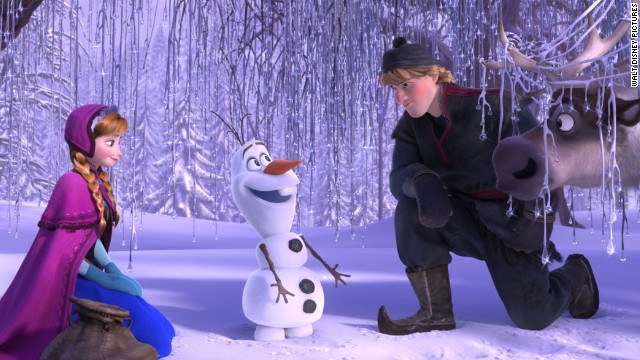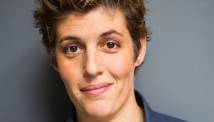
- Sally Kohn: What kind of families are portrayed in Disney movies are political choices
- Kohn: "Frozen" may be the most forward-looking Disney film, but it still has a long way to go
- She asks, why can't children's films actively reflect the diversity of families in America
- Kohn: It's time that we have a Disney movie in which a princess marries a princess
Editor's note: Sally Kohn is a progressive activist, columnist and television commentator. Follow her on Twitter: @sallykohn.
(CNN) -- With my last CNN.com column, I managed to start a small kerfuffle among conservatives. I wrote about how pathetic it is that historically, most Oscar-winning directors and producers have been white men — and how this reflects implicit bias more broadly in Hollywood and our society in general.
Some people on Twitter criticized my argument. Among other things, they accused me of playing the race card -- echoing a very contorted line of conservative idea that liberals who call out racism in society are actually the racists.
And so I responded with a question:

Conservatives, do u not attribute lack of black Oscar winners to implicit racial bias? And if not, then what?
— Sally Kohn (@sallykohn) January 23, 2014 This was a question to conservatives about how they would otherwise explain the lack of black Oscar-winning and nominated directors and producers, if they don't attribute it to racism.
However, conservatives interpreted the question as though I was blaming them for implicit racial bias in Hollywood. For the record, I was not. What I was doing was accusing our dominant cultural institution in America of at the very least failing to challenge the implicit biases of society in general and at worst replicating them. In my original essay, I wrote:
"Does Hollywood exclude women and people of color in powerful director and producer roles more than other facets of American business and society? Probably not, but who cares? That doesn't make the critique any less worth leveling."
Which brings us to kerfuffle number two. Saturday evening, while watching the Disney animated film "Frozen" with my 5-year-old daughter, I tweeted:
Watching Frozen, it's awesome. But come on @DisneyPictures ain't it finally time for a kid's film where the princess marries a princess?!
— Sally Kohn (@sallykohn) January 25, 2014 Yet again, I got rapped for it. Reactions ranged from "children do not need to be indoctrinated into your pro-dyke anti-natural family propaganda" to "Kids movies should be off limits to far left ideology." Some even accused me of being a pedophile. Lovely Internet. And my tweet was reposted and condemned on several conservative websites, from Twitchy to Breitbart's Big Hollywood and more.
That's the context. And so, since conservatives are jonesing for a conversation about this, let's have at it!
Culture with a capital-C is political. The rise of Mackelmore or Jay Z is as much about talent as a calculation on the part of the record industry to factor in race. Women's necklines and hemlines are conscious decisions about gender and sexuality made by the fashion industry. And yes, Disney movies are political, too -- from the decision that all the female characters should have one-inch waistlines to the idea that princes are heroes and princesses need saving to the fact that all Disney princesses were white until Mulan, Jasmine and Tiana came along.
Choices about what families are portrayed or excluded in Disney movies, and children's movies in particular, are political. Laws prohibiting interracial marriage were struck down by the Supreme Court in 1967, but as far as I know, there has still not been a biracial or multiracial family at the center of a Disney film (though at least Sofia the First is potentially a teeny-weeny step in the right direction).
Despite the fact that one in four children in the United States today is being raised by a single parent, single moms in Disney movies are mostly portrayed as evil (think "Cinderella" and "Snow White"). At least single fathers get better treatment ("Pinocchio" and "Beauty and the Beast").
While it appears that there is a gay family depicted in Disney's latest film, "Frozen," and there are six other reasons why "Frozen" may be the most forward-looking Disney film yet, the film still continues a long and unbroken chain of hetero-normative children's movies.
Look, I'd be happy if we could get a brave, independent, non-offensively-skinny, non-obsessively-boy-crazy princess who isn't then Photoshopped for sex appeal. That would be nice for my daughter to see.
But of course I want to see children's films go a step further and actively reflect the full, positive diversity of families in America today -- including gay families like mine. After all, we're talking about Hollywood -- land of the gays and those who love them! Is this really too much to ask? Gay rights are sweeping the globe, supported morally and politically by an overwhelming majority of Americans.
The fact is mass culture is incredibly, frustratingly reactionary. It can seem that Miley Cyrus is twerking far before any of us are ready to see it, but the fact is that's just the corporate-backed culture industry picking up on underground trends in mass culture and amplifying them. Conversations about race and gender and sexuality in mainstream film often lag behind society as well.
There are times when film can propel society in the right direction, whether it's "In the Heat of the Night" or "Tootsie" or "Philadelphia" or any other number of groundbreaking films. We don't think of children's films as a space for social progress and yet that's exactly where our society's norms and ideals are most embedded -- how the next generation learns right and wrong and good and evil and inclusion and exclusion can start when people are young. Hollywood can do a better job of making inclusive kids' movies that reflect the wonderful diversity of 21st century America.
So yes, it's high time that we have a Disney movie in which a princess marries a princess. And a prince marries a prince. And a plumber marries a schoolteacher — for crying out loud, why must everyone be royal and rich?!
Follow us on Twitter @CNNOpinion.
Join us on Facebook/CNNOpinion.
The opinions expressed in this commentary are solely those of Sally Kohn.
No comments:
Post a Comment